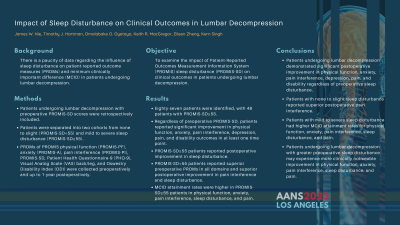Impact of Sleep Disturbance on Clinical Outcomes in Lumbar Decompression
Friday, April 21, 2023


James W. Nie, BS (he/him/his)
Medical Student
University of Illinois College of Medicine
Chicago, Illinois, United States
ePoster Presenter(s)
Introduction: There is a paucity of data regarding the influence of sleep disturbance on patient-reported outcome measures (PROMs) and minimum clinically important difference (MCID) in patients undergoing lumbar decompression. This study aims to examine the impact of Patient-Reported Outcomes Measurement Information System (PROMIS) sleep disturbance (PROMIS-SD) on clinical outcomes in patients undergoing lumbar decompression.
Methods: Patients undergoing lumbar decompression with preoperative PROMIS-SD scores were retrospectively included. Patients were separated into two cohorts from none to slight (PROMIS-SD < 55) and mild to severe sleep disturbance (PROMIS-SD≥55). PROMs of PROMIS physical function (PROMIS-PF), anxiety (PROMIS-A), pain interference (PROMIS-PI), PROMIS-SD, Patient Health Questionnaire-9 (PHQ-9), Visual Analog Scale (VAS) back/leg, and Oswestry Disability Index (ODI) were collected preoperatively and up to 1-year postoperatively.
Results: Eighty-seven patients were identified, with 48 patients with PROMIS-SD≥55. Regardless of preoperative PROMIS-SD, patients reported significant improvement in physical function, anxiety, pain interference, depression, pain, and disability outcomes in at least one time point (p≤0.030,all). PROMIS-SD≥55 patients reported postoperative improvement in sleep disturbance (p < 0.001,all). PROMIS-SD < 55 patients reported superior preoperative PROMs in all domains and superior postoperative improvement in pain interference and sleep disturbance (p≤0.043,all). MCID attainment rates were higher in PROMIS-SD≥55 patients in physical function, anxiety, pain interference, sleep disturbance, and pain (p≤0.049,all).
Conclusion : Patients undergoing lumbar decompression demonstrated significant postoperative improvement in physical function, anxiety, pain interference, depression, pain, and disability regardless of preoperative sleep disturbance. Patients with none to slight sleep disturbance reported superior postoperative pain interference. Patients with mild to severe sleep disturbance had higher MCID attainment rates for physical function, anxiety, pain interference, sleep disturbance, and pain. Patients undergoing lumbar decompression with greater preoperative sleep disturbance may experience more clinically noticeable improvement in physical function, anxiety, pain interference, sleep disturbance, and pain.
Methods: Patients undergoing lumbar decompression with preoperative PROMIS-SD scores were retrospectively included. Patients were separated into two cohorts from none to slight (PROMIS-SD < 55) and mild to severe sleep disturbance (PROMIS-SD≥55). PROMs of PROMIS physical function (PROMIS-PF), anxiety (PROMIS-A), pain interference (PROMIS-PI), PROMIS-SD, Patient Health Questionnaire-9 (PHQ-9), Visual Analog Scale (VAS) back/leg, and Oswestry Disability Index (ODI) were collected preoperatively and up to 1-year postoperatively.
Results: Eighty-seven patients were identified, with 48 patients with PROMIS-SD≥55. Regardless of preoperative PROMIS-SD, patients reported significant improvement in physical function, anxiety, pain interference, depression, pain, and disability outcomes in at least one time point (p≤0.030,all). PROMIS-SD≥55 patients reported postoperative improvement in sleep disturbance (p < 0.001,all). PROMIS-SD < 55 patients reported superior preoperative PROMs in all domains and superior postoperative improvement in pain interference and sleep disturbance (p≤0.043,all). MCID attainment rates were higher in PROMIS-SD≥55 patients in physical function, anxiety, pain interference, sleep disturbance, and pain (p≤0.049,all).
Conclusion : Patients undergoing lumbar decompression demonstrated significant postoperative improvement in physical function, anxiety, pain interference, depression, pain, and disability regardless of preoperative sleep disturbance. Patients with none to slight sleep disturbance reported superior postoperative pain interference. Patients with mild to severe sleep disturbance had higher MCID attainment rates for physical function, anxiety, pain interference, sleep disturbance, and pain. Patients undergoing lumbar decompression with greater preoperative sleep disturbance may experience more clinically noticeable improvement in physical function, anxiety, pain interference, sleep disturbance, and pain.
